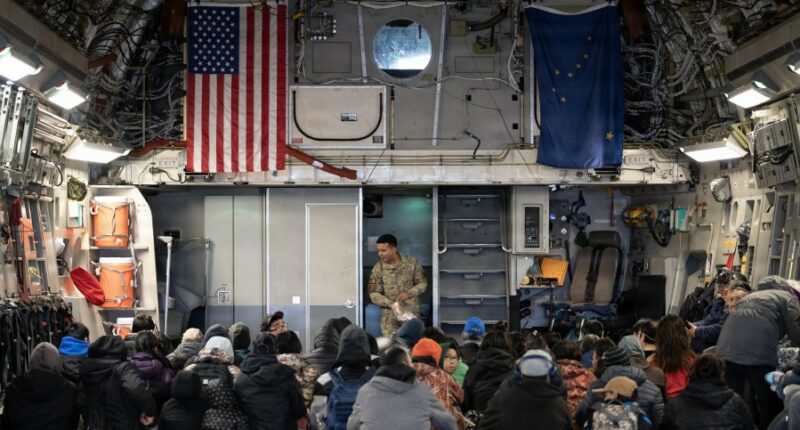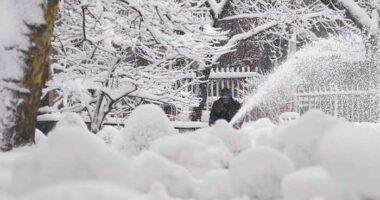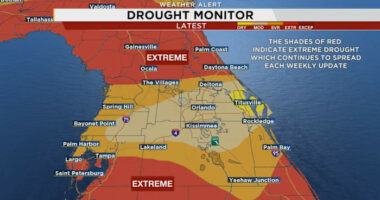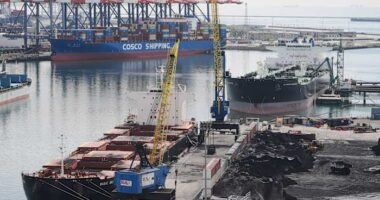Share this @internewscast.com

ANCHORAGE, Alaska — Last weekend’s devastating flooding has left remote villages in Alaska with such severe damage that over 2,000 displaced residents may face an 18-month wait before returning home, according to Governor Mike Dunleavy. He has formally requested a major disaster declaration from the White House.
In Kipnuk, one of the most severely affected communities, a preliminary survey revealed that 121 houses, accounting for 90% of the village’s homes, have been destroyed, Dunleavy reported. Meanwhile, in Kwigillingok, around a third of the homes became uninhabitable, with dozens swept away by the waters.
The catastrophe was triggered by the remnants of Typhoon Halong, which battered the area with the intensity of a Category 2 hurricane. A violent storm surge inundated the low-lying region, resulting in one fatality and two missing persons. Rescue teams managed to save dozens as their homes drifted away.
Efforts are underway to evacuate residents from the flooded Alaska Native villages. Over 2,000 individuals have sought refuge either in local schools, larger communities in southwest Alaska, or have been flown to Anchorage, the state’s largest city, by military aircraft.
Anchorage officials anticipate receiving up to 1,600 evacuees. Approximately 575 people have already been transported to the city by the Alaska National Guard, where they are currently housed in a sports arena and a convention center. Additional flights were scheduled for Friday and Saturday.
Authorities are actively coordinating plans to transition evacuees from emergency shelters to short-term lodgings, such as hotels, and eventually to more permanent housing solutions.
“Due to the time, space, distance, geography, and weather in the affected areas, it is likely that many survivors will be unable to return to their communities this winter,” Dunleavy said. “Agencies are prioritizing rapid repairs … but it is likely that some damaged communities will not be viable to support winter occupancy, in America’s harshest climate in the U.S. Arctic.”
The federal government already has been assisting with search and rescue, damage assessments, environmental response and evacuation support. A major disaster declaration by President Donald Trump could provide federal assistance programs for individuals and public infrastructure, including money for emergency and permanent work.
The three members of Alaska’s congressional delegation on Friday sent a letter to Trump, urging swift approval.
The storm surge pummeled a sparsely populated region off the state’s main road system where communities are reachable only by air or water this time of year. The villages typically have just a few hundred residents, who hunt and fish for much of their food, and relocating to the state’s major cities will bring a vastly different lifestyle.
Alexie Stone, of Kipnuk, arrived in Anchorage in a military jet with his brothers, children and mom, after his home was struck by the flooding. They’ve been staying at the Alaska Airlines Center at the University of Alaska, where the Red Cross provided evacuees with cots, blankets and hygiene supplies.
At least for the foreseeable future, he thinks he might try to find a job at a grocery store; he used to work in one in Bethel.
“It’s going to be, try to look for a place and find a job,” Stone said Friday. “We’re starting a new life here in Anchorage.”
Anchorage officials and business leaders said Friday they were eager to help the evacuees.
“Our neighbors in western Alaska have experienced tremendous loss, devastation and grief,” Mayor Suzanne LaFrance said at a meeting of the Anchorage Assembly. “We will do everything we can here in Anchorage to welcome our neighbors and help them through these difficult times.”
State Rep. Nellie Unangiq Jimmie, of Toksook Bay, on an island northwest of Kipnuk, described for the assembly how she rode out the storm’s 100 mph (161 kmh) winds with her daughter and niece.
“We had no choice but to sit in our home and wait to see if our house is going to come off the foundation or if debris is going to bust open our windows,” she said.
It didn’t, but others weren’t as fortunate. She thanked Anchorage for welcoming the evacuees.
“You are showing my people, my relatives, my constituents, even if they are far from home, this is still Alaska land and they’re amongst families,” Jimmie said.
___
Johnson reported from Seattle.










